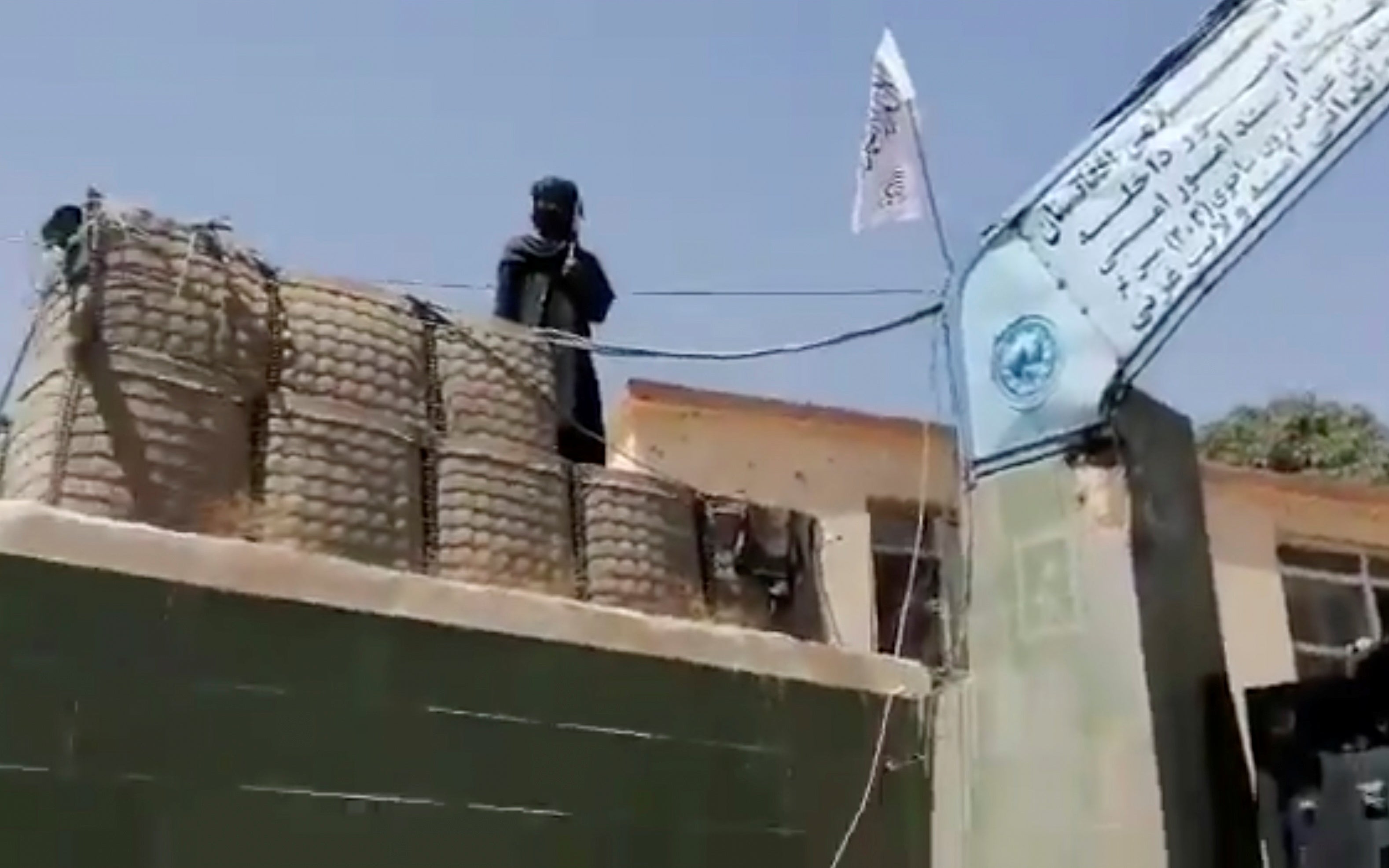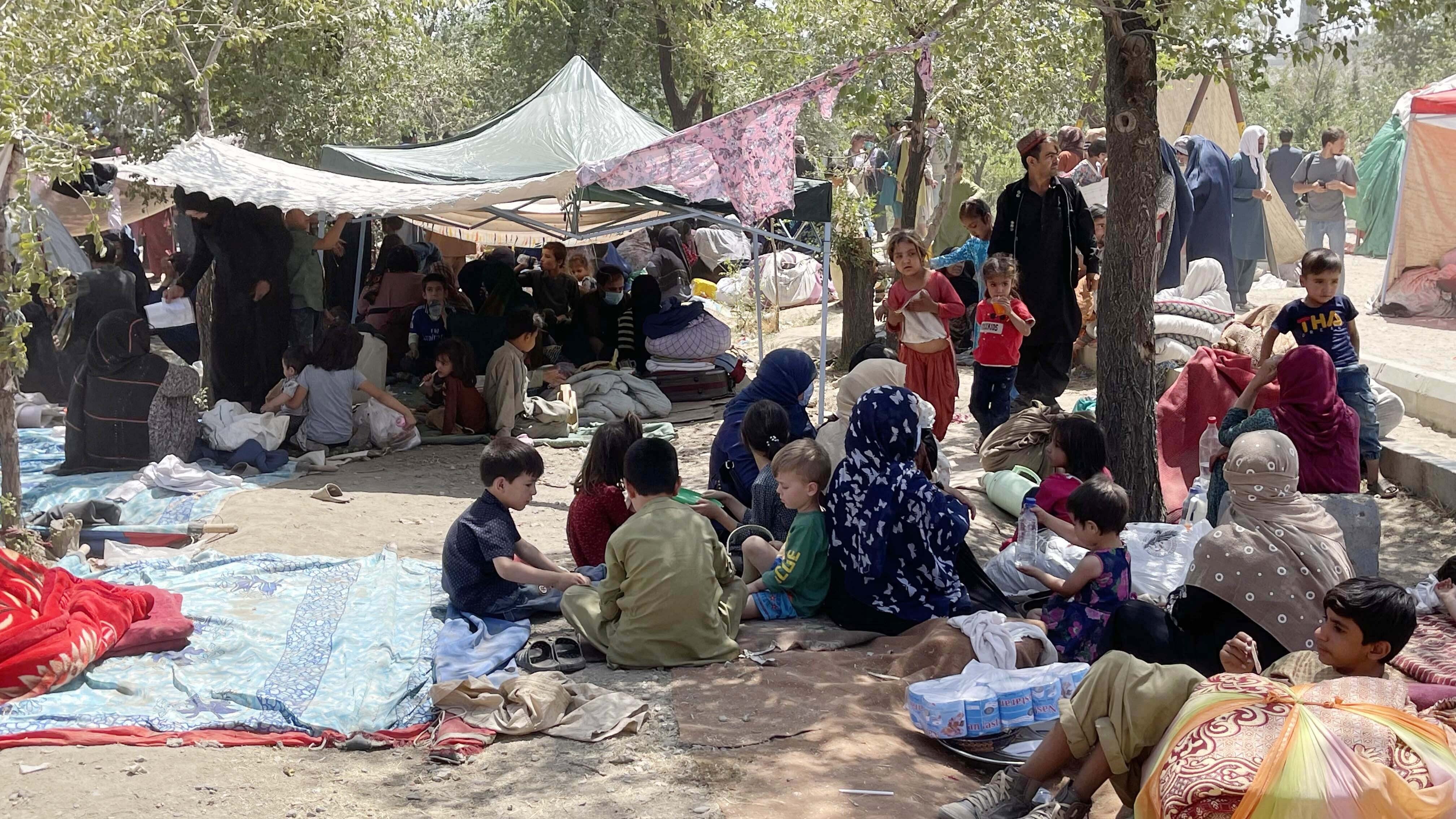Afghanistan’s third largest city of Herat falls as Taliban closes in on Kabul
Thousands have been driven across the countryside to the Afghan capital where there is now a growing refugee crisis, writes Kim Sengupta in Kabul


The Taliban appears to have gained their biggest prize so far in their military offensive, with reports that they had captured Herat, a huge symbolic and strategic gain which gives them control of the west of the country.
Ismail Khan, the veteran mujahedin commander, who had been leading a volunteer militia against the Islamist group, is believed to have left the city along with military commanders and members of the provincial government.
The reported seizure of Herat, the country’s third largest city, came in a sudden and sustained attack after the insurgents had been pushed back from the areas they held by an Afghan government operation earlier in the week.
Residents sent pictures and videos of Taliban fighters in the centre of the city and at the governor’s palace, and the Taliban flag flying at the main police station. One woman, whose husband is in Kabul, said: “We are terrified, we don’t know what’s going to happen, there are Taliban checkpoints everywhere, we cannot leave our homes.”
The Islamists also made gains in two southern cities, Kandahar and Lashkar Gah, where there have been ongoing battles for days. The central police station at the Helmand capital was captured after an attack using suicide bombers. Another prison was taken in Kandahar, with the inmates released, although it is believed most of the senior insurgents being held there had been moved to Kabul. Reports late on Thursday suggested Kandahar had fallen, or was on the brink of falling, to the Taliban advance.
The Taliban gains came on the same day that Ghazni was captured, further tightening the noose around Kabul, with the Taliban seemingly aiming to isolate and then attack the capital in the coming weeks.
Ghazni is just 80 miles from Kabul, and on the main route to Kandahar in the south. Its capture came 48 hours after the seizure of Pul-e-Khumri, 140 miles north of Kabul, in what appears to be a rapidly progressing encirclement of the capital.
Ghazni was the tenth provincial capital to fall in less than a week, with government forces unable to contain the Islamists’ advance. Strife, and fear of the approaching jihadists, has driven thousands of people from across the country to flee to Kabul where there is now a growing refugee crisis.
Facing the relentless onslaught, the government is said to have offered power sharing with the Taliban in return for an end to violence. According to a number of diplomats, the approach was made through the Qatari government at the talks being held between the two sides in Doha.
The head of the Afghan government, Abdullah Abdullah, told a meeting of the delegations: “We are committed to end the conflict through negotiations, we are seeking political settlement and want a third party to mediate the peace talks. We have presented our scheme to the host nation and you will also be provided with it.”
The position of the Afghan government until now has broadly been that the Taliban should contest elections to gain power, with ministers complaining that the terms being offered by the Islamist group were effectively a demand for surrender.
We are paying the price for our government not securing the border with Pakistan and also the Americans leaving us the way they did
While the talks are between the Taliban and the Afghan government, they are also attended by diplomats and envoys from the US, UN, EU, Britain, Pakistan, China and Uzbekistan, with most of them urging the two sides to come to a compromise to end the bloodshed.
The US administration has warned that a Taliban regime which seized power by force would face international isolation. Washington’s Special Representative to the talks, Zalmay Khalilzad, maintained that “they will become a pariah state”.
Germany has warned that it will not provide any aid to a Taliban regime if it takes over through violence and imposes oppressive religious rules. Foreign Minister Heiko Maas said: “We provide 430 million Euros every year, we will not give another cent if the Taliban takes over the country and introduces Sharia law.”
But as well as Pakistan, its main backer, the Taliban has received support from a number of states, including Russia and China, and it is unlikely that Western censure would make it halt its military momentum.
The Taliban took control in Ghazni after a night of fighting. The governor, who handed over control, left the city on Thursday afternoon. As they had done in other cities they had captured, the Islamist fighters opened the prison gates, freeing around 300 inmates.
A resident, who only wanted his first name, Rahimtullah, made public, said: “People are staying in their homes, no one wants to risk going out. We are hearing that the Taliban are asking public officials to report for work and saying they won’t be harmed. But everyone is very suspicious of their promises.”
The conflict has resulted in around a million people being displaced in the past few months, according to the Afghanistan Independent Human Rights Commission (AIHRC), with the vast majority of them moving to Kabul.

The refugees are sleeping in parks as well as mosques and public buildings, with a tented camp set up on the Shomali Plains outside the city. The State Ministry for Disaster Management said it was building camps for up to 10,000 people in the next week, with more to follow.
More than 500 people have been put up at the main mosque in the Wazir Akbar Khan district of the capital after arriving in the past week.
Izatullah Watanwal arrived from Kabul from the northern city of Kunduz after the Taliban took over the city, arriving by bus last Saturday. “The normal fare was 800 Afghanis ( £7) for each person, but the company took advantage of the situation to raise the price to 2,000 Afghanis each, but we paid to get away, we came in the clothes we were wearing at the time,” he said.
Mr Watanwal, 31, worked as an engineer for Kunduz municipality. “I got a call from a Talib in Kunduz after I had arrived in Kabul,” he said. “They must have got details of employees from the records. This man said: ‘Come back, we need people like you to keep the city running, don’t worry we have forgiven those who worked for the government’.
“But I had heard that they killed people in other areas who went back to work, and I refused. The Talib threatened that I’d be punished if I stayed away.”
Izatullah Kamily and his family were forced out of their home by Islamist fighters who used the building as a firing point. He made up his mind to leave Kunduz with his family after seeing a neighbour hit by shrapnel and bleed to death.
We held drills for this kind of situation, but we did not expect so many people to come so quickly
“He was not that badly hurt and would have lived if he received medical treatment, but he couldn’t be taken to the hospital because of the fighting. We decided then that we must get away before anything happened to us,” said Mr Kamily, a 28-year-old cook.
Neither of the men expected to go back to Kunduz in the near future, and neither knew what the future held for them. Others in the same position are angry at both the Afghan government and the West.
“We are paying the price for our government not securing the border with Pakistan and also the Americans leaving us the way they did”, said Rafi Bikzad from Takhar. “Even now we don’t see the political unity needed if we are to have any hope of recovering what we lost.”
Hasibullah Hashimi, who worked at the State Ministry for Disaster Management, acknowledged that officials had been unprepared for the scale of the problem being faced.
“We held drills for this kind of situation, but we did not expect so many people to come so quickly. We are providing these people with food and bedding for three days, another government will take over after that. The situation is difficult for everyone, including people in Kabul.”
While people have been coming into Kabul, supplies of goods, including food, are being restricted and prices are going up sharply. Shopping in the Sherpur district, Amir Wardak complained “the cost of shopping for my family’s dinner has gone up by 50 per cent. It is hard for us, but much harder for people who are poor.
“Officials need to act to stop this kind of price exploitation. The Taliban go into places they take and order merchants to lower prices, and of course that’s what happens. The Taliban gain popularity that way. The government needs to remember that fast.”
Join our commenting forum
Join thought-provoking conversations, follow other Independent readers and see their replies
Comments
Bookmark popover
Removed from bookmarks